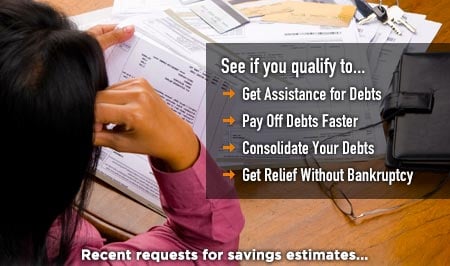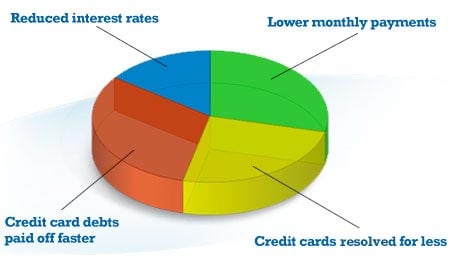
Debt Reduction
In these tough economic times, many residents in New York and across the country are seeking debt reduction and relief from credit cards and other types of unsecured debts -- such as medical bills, retail store charges, or even utilities. If you are also struggling with credit card and unsecured debts, you may be interested in exploring your available debt relief options that can help reduce your debts and give you -- and your family -- a fresh, new start.
With debt consolidation or a debt management plan (DMP), the goal is to provide consumers struggling with multiple, high interest debts with one, more structured, and more manageable payment plan made to a credit counseling agency. While debt consolidation is a smart move for many consumers seeking debt relief, it is certainly not the only option available. Depending on your debt situation, debt settlement may be a viable option. It allows consumers with high credit cards an opportunity to settle, or negotiate, with their creditors to pay significantly less than what they originally owed. These days, both debt consolidation and debt settlement have become popular alternatives to bankruptcy -- also a form of debt relief, but it's an option that has a more damaging and longer lasting impact on your personal credit.
Find out how debt relief can help you manage and reduce debts. Answer a few, simple questions and get a free debt relief analysis and savings estimate. Start now!
Consolidate to Reduce Debts?
Debt consolidation, or a debt management plan (DMP), involves combining, or "consolidating," your high-interest credit card and unsecured debts into a single, more structured, and more affordable monthly payment made to a credit counseling agency. Credit counselors review your financial situation, taking into account your income, debts, and other obligations. Afterwards, they will typically develop a debt reduction strategy to help you pay off your debt at a more manageable pace. They do so by speaking to creditors on your behalf asking for reduced or lower interest rates, as well as waiving of late fees and other penalties. Creditors that agree to those proposals are entered into the debt management plan.
Consolidating debts through credit counseling is a wise move for many consumers who are ready to tackle their debts and find a proven way that can help them manage their debts. With a free debt relief analysis and savings estimate, you can find out how much you could possibly save every month. Start here.
Debt Settlement Alternative
When you enroll in a debt settlement program, you are hoping to settle or negotiate with your creditors to pay significantly less than the debt amount you originally owed. That is the main difference between settling your debts versus consolidating your debts through credit counseling -- where you are paying the entire amount of your debts, just at lower interest rates.
When considering debt settlement, it's important to know the potential drawbacks: As the term "debt settlement" implies, your creditors are certainly not legally required to "settle" or accept your settlement proposal. In many cases, you will be advised to stop making payments on your credit cards to save up funds, over a period of time, for use when making a settlement offer. While in the process of saving up funds and not making payments, however, many consumers face the threat of a lawsuit from creditors for defaulting on the terms of their credit card agreements. In addition, many consumers who default on the terms of their credit card agreements typically see a decline in their credit scores.
But in spite of the risk involving one's credit, debt settlement remains a popular debt relief alternative to bankruptcy -- which, as mentioned previously, can have a more serious and longer-lasting effect on your personal credit.
Explore Your Options and Get Relief
When it comes to finding debt relief, each individual's financial situation is unique. That's why it makes sense to find out what your best debt reduction options are -- whether it's in the form of debt consolidation or debt settlement. As noted earlier, the goal of a debt consolidation program is to provide you with a single, more affordable, and more manageable payment plan made to a credit counseling agency. With a more structured plan in place, you can hopefully pay your debts at an accelerated rate -- sooner than if you only continued to make the minimum monthly payments at higher interest rates.
The bottom line is, if you are struggling with debts from credit cards and other unsecured debts, it is a smart move to find out what your available debt relief options are and how much you can potentially save with a debt consolidation program. Answer a few, simple questions now to get a free debt relief analysis and savings estimate.























